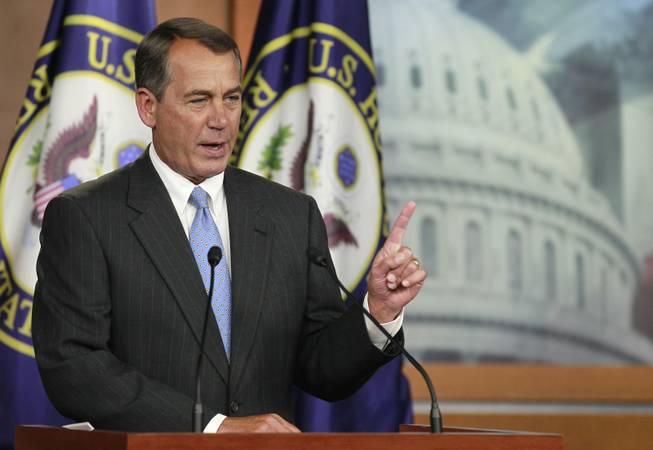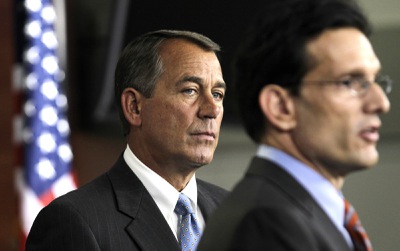
Alex Brandon / AP
House Speaker John Boehner of Ohio gestures during a news conference Thursday on Capitol Hill in Washington to discuss repealing President Barack Obama’s health care plan.
Friday, Jan. 7, 2011 | 2 a.m.

Joe Heck

Dean Heller

Harry Reid
Sun coverage
Sun archives
- Repeal of health care bill tops agenda as GOP takes over House (1-5-2011)
- White House dismisses health care repeal effort (1-5-2011)
- Obama admin. hits back against health care repeal (1-4-2011)
- Senate Democrats vow to block health care repeal (1-3-2011)
- House GOP sending Obama a message on health repeal (1-3-2011)
Remember the faraway days of the 2010 midterm elections, when Republicans swept races across the country on a doggedly anti-spending, deficit-reduction platform? Barely 24 hours into the 112th Congress, there’s been a major party role reversal: It’s the Democrats now who are the deficit hawks, and they’re laying into Republicans for playing fast and loose with the federal budget.
It all started with the first House vote.
After swearing in their speaker and taking the oath of office Wednesday, the representatives of the House set austere limits on spending and mandated cuts to offset the cost of any proposed change to government — unless that change happens to be on the list of Republicans’ policy priorities, in which case: requirement waived.
Democrats were upset enough over the 240-191 rules vote, which split cleanly along party lines. But by midday Thursday, their anger had escalated to fever-pitch fury; that’s when Republican leaders, presented with a budget analysis that put a high price on any repeal of the new health care law, tried to quash the numbers.
“I do not believe that repealing the job-killing health care law will increase the deficit,” said Speaker John Boehner, when asked to react to a Congressional Budget Office assessment that put the costs of repealing the law passed last year at $230 billion over 10 years, and $1.4 trillion over the next 20 years.
“The CBO is entitled to their opinion,” he added.
Democrats flew at Boehner’s comments, accusing him and the GOP of participating in “Enron-style accounting” to hide costs, and set a precedent where substituting interest-driven assessments for nonpartisan government analyses would become acceptable.
Lawmakers may adopt rhetoric of cost reduction, but the Congressional Budget Office is the chief congressional agency tasked with establishing the actual costs of proposals. As a nonpartisan body, it doesn’t discriminate, crunching numbers for requests as they are made.
But sometimes, that can lead to apparently contradictory results.
“The present score says the repeal of the health care bill’s going to add $230 billion to the deficit ... but back in July, they said that passing the bill was going to cost $500 billion,” said Rep. Joe Heck, Nevada’s freshman Republican who, as a medical professional, has kept a close eye on the legislation.
Heck has a point. CBO scores are a lot like polling, in that the nonpartisan economists who make up the unit crunch the numbers they’re told to crunch. So even though it is nonpartisan, CBO analyses can be skewed depending on what lawmakers ask them to review — similarly to how polls can swing based on the way questions are asked.
GOP leaders noticed the same discrepancy, and charged that the Democrats are doing a bit of book-cooking of their own — among other things, ignoring $115 billion needed to implement the law, double-counting $521 billion in Social Security payroll taxes to offset the law and counting 10 years of revenue to offset six years of spending, a comparison they say is inappropriate.
“Any program that uses 10 years of revenue to offset six years of service is obviously unsustainable,” Nevada Republican Rep. Dean Heller said. “The repeal of this law will not only reduce federal spending, but it will also allow Congress to address problems within the current health care system without onerous government intrusion.”
But Democrats say the Republicans — who officially call the health care bill they once termed “Obamacare” the “job-killing health care bill” — began waging a vendetta against the legislation even before it was passed; and that the latest attempts to discredit it are just as illegitimate as former ones.
“This piece of legislation was demonized from the beginning, from suggesting there were death panels to now,” Nevada Democratic Rep. Shelley Berkley said. “But this is not only hypocritical, it’s reckless. If you’re going to campaign against deficit spending, you’d better not vote to raise the deficit once you get to Washington.”
Democrats stress that rolling back the bill at this point will have effects that will ricochet through the population, since many provisions took effect at the new year: It’s now illegal to deny coverage based on pre-existing conditions, for example; additionally, the so-called “doughnut hole” that underwrites a portion of the costs of prescription medication for seniors is closed, and offspring up to age 27 are allowed to receive coverage under their parents’ insurance plans.
That would all disappear with the repeal of the bill.
The debate over fair accounting rages on at least through the coming week, when House leaders have scheduled a vote on repeal of the package.
But not all Republicans are ready to brush off the CBO score — or even the bill as a whole, for that matter.
“It’s very hard to quantify things that you think will or won’t happen in five or 10 years — it’s difficult for anybody, but especially with a health care bill,” Heck said.
Despite the momentum in his party against the measures, he’s not yet willing to say he’ll vote against it.
“As I said during the campaign, there are good things about this bill,” he said. “I’m waiting to see what the actual repeal bill language states, and I’m very concerned about making sure there’s a replacement in the queue.”
Replacements, in fact, will probably be a necessity in the coming months no matter how the vote goes. There remain provisions that members of both parties are eager to fix: For example, almost all members want to correct the compensation deficit for doctors who treat Medicare patients, and reduce the onerous Internal Revenue Service paperwork.
Broader efforts than that will, in the end, fall short.
Although Senate Republicans reiterated their promise to bring the bill to the floor, the way is firmly blocked by the majority leader’s refusal to allow a repeal of the health care law, a commitment he reiterated Thursday.
“We’re willing to work in any way that’s constructive in nature to improve the health care delivery system for our country,” Senate Majority Leader Harry Reid said. “But repealing health care? They should get a new, new lease on life and talk about something else.”
But health care won’t be the last chapter on spending.
The new rules package also waives the budget offset requirement for tax cut proposals, and prevents Congress from raising taxes as a way of paying for new programs.
It’s not just about the rules though: Congress is also hurtling toward a moment of reckoning that will come in April, when lawmakers have to decide whether they will vote to raise the debt ceiling to accommodate the country’s more than $14.3 trillion of debt. Not doing so — as many Tea Party-leaning lawmakers have advocated — would seemingly cap the country’s ability to spend.
But it would also set up a situation in which the country could default on existing debts, which would in turn jeopardize the country’s top-level credit rating.
“We’re going to have to deal with it as adults,” Boehner said. “Whether we like it or not, the federal government has obligations and we have obligations on our part.”
The head Democrat agreed.
“I would agree with the new speaker,” Reid said, quoting Boehner at his news conference, calling the debt ceiling “the one thing” upon which he thinks the two party leaders concur.


Join the Discussion:
Check this out for a full explanation of our conversion to the LiveFyre commenting system and instructions on how to sign up for an account.
Full comments policy